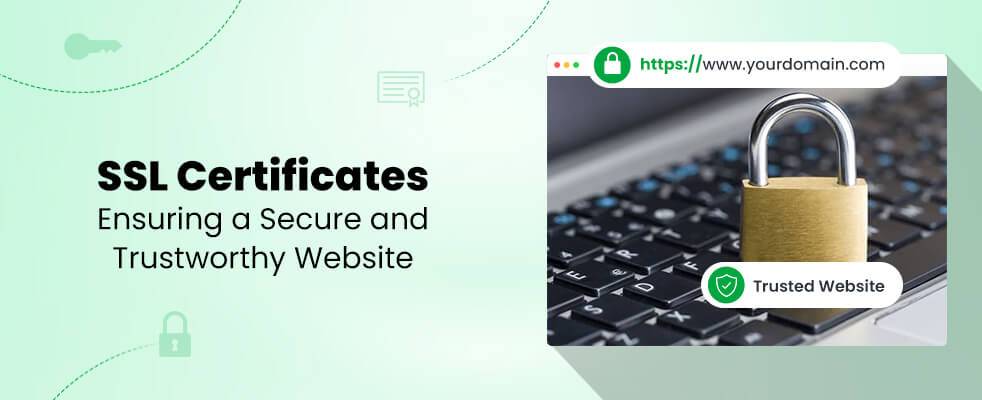
In an increasingly growing digital world, online security is a top concern for businesses and more for users. And in an ever-evolving landscape of cyber threats, it has become critical to implement measures that safeguard sensitive data. One such measure is the use of SSL certificates. In this blog post, we will learn the importance of SSL certificates and how they contribute to a secure and trustworthy website.
What is the SSL Certificate?
SSL Certificate is a digital certificate to establish a secure connection between a user’s web browser and the website they are visiting. It encrypts the data transmitted between the user’s device and the website, protecting it from unauthorized access and interception. SSL certificates are identified by the padlock symbol and the “https” prefix in the website URL, indicating a secure connection.
Benefits of SSL Certificate
-
-
Establishing Secure Data Encryption:
The heart of SSL certificates is data encryption. It encrypts sensitive data, such as login credentials, credit card information, and personal details. This encryption scrambles the data, making it unreadable to anyone attempting to intercept it, and keeps it secure.
-
Building User Trust and Confidence:
Trust is a vital element in any successful online venture. SSL certificates enhance user trust and confidence in a website. When users see the padlock symbol or the “https” prefix in their browser’s address bar, they know that their connection to the website is secure. This visual indication assures them that their data will be transmitted securely. Displaying these trust indicators instills confidence in users, encouraging them to engage with the website, make purchases, and share their information without hesitation.
-
Boosting Search Engine Rankings:
SSL certificates have become a ranking factor in search engine algorithms. Websites with SSL certificates tend to rank higher in search engine results, making it beneficial for search engine optimization efforts resulting in increased organic traffic and better visibility for your website.
-
Protection Against Cyberattacks:
Cyber threats continue to pose significant risks to online businesses. SSL certificates protect websites from various cyber threats, such as data breaches, phishing attacks, and man-in-the-middle attacks. Encryption provided by SSL certificates prevents unauthorized access, safeguards sensitive information, and maintains the integrity of data transmission, making it harder for attackers to deceive users.
-
Meeting Compliance Requirements:
Compliance with data protection regulations is essential for businesses operating in various industries. Many data protection regulations, such as the General Data Protection Regulation (GDPR), mandate SSL certificates when handling and transmitting personal data. Implementing SSL certificates helps businesses comply with these regulations and avoid potential penalties or legal complications.
-
Obtaining an SSL certificate involves several steps
-
-
- Choose the SSL certificate based on the website’s needs.
- Purchase an SSL certificate from a reputed Domain Name Registrar or hosting provider. Check out the different ranges of SSL certificates to fit your budgets and requirements.
- Obtain a Certificate Signing Request (CSR) from your web hosting provider or server.
- Complete the verification process to validate your ownership and organizational details.
- Install the SSL certificate on your website’s server, as per the instructions by the seller or your hosting provider.
-
Conclusion
SSL certificates are more than just a security measure. They are a critical component of a modern website. Other than encrypting data, building user trust, boosting search engine rankings, safeguarding against cyber attacks, and meeting compliance requirements, SSL certificates play a multifaceted role in ensuring a secure and trustworthy online environment. Every business that values its customers and their sensitive information should prioritize the implementation of SSL certificates. By doing so, they can establish a robust online presence, inspire user confidence, and protect their valuable assets in an increasingly digital world.
Remember, prioritizing website security is crucial in establishing an online presence and maintaining the trust of your visitors.








